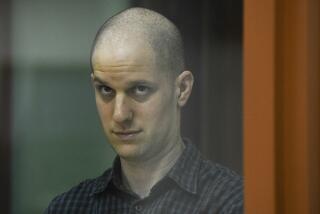Russian justice on trial
Russia’s media and judicial system have not operated all that independently, so we were pleasantly surprised and hopeful last week when a military court decided to open its doors for journalists to cover the trial of three men accused as accessories in the murder of Russian reporter and Kremlin critic Anna Politkovskaya. A day later, however, the judge reversed himself, citing the civilian jurors’ fears that publicity could put them at risk. Then a remarkable thing happened: One of the jurors went on the radio to say they hadn’t requested a closed court; rather, the court secretary had warned them of the dangers of an open trial and sought their signatures on a statement requesting a media ban. They declined.
On Friday, the judge suspended the trial until Dec. 1, but then changed his mind again on Monday, calling the court back into session today to discuss “procedural issues.” While we are feeling whiplashed, we’re also wondering what kind of pain the judge must be experiencing to make him change course so often. We hope that the procedures addressed today don’t include replacing the jury and that the judge decides once more to allow the public scrutiny that the Politkovskaya family and three defendants have requested. Only prosecutors have sought a closed court, to prevent the possible revelation of state secrets, given that one of the defendants is a former police officer and a defendant in a related case is a colonel in Russia’s Federal Security Service intelligence agency.
The three defendants have denied charges that they were accomplices in the contract-style killing of Politkovskaya, who was shot in the elevator of her Moscow apartment block in October 2006. The gunman, filmed on CCTV as he entered her building, has not been captured, and it is not known who ordered the murder. Politkovskaya was a fierce critic of the government’s human rights record, particularly in Chechnya, and she had received international recognition for her work in the Russian newspaper Novaya Gazeta. She is but one of 49 journalists killed in Russia in the last 16 years, according to the New York-based Committee to Protect Journalists, a record second only to Iraq and Algeria.
Two years ago, two men accused in the murder of the American editor of the Russian edition of Forbes magazine, Paul Klebnikov, were acquitted in a closed trial, and his murder is still unresolved. This time, human rights activists hope that an open trial will bring information about the Politkovskaya murder to light and ensure that justice is carried out. Surely the judge can find ways to guarantee the jurors’ safety and the security of state secrets while protecting the public’s interest in this trial.
More to Read
Sign up for Essential California
The most important California stories and recommendations in your inbox every morning.
You may occasionally receive promotional content from the Los Angeles Times.










